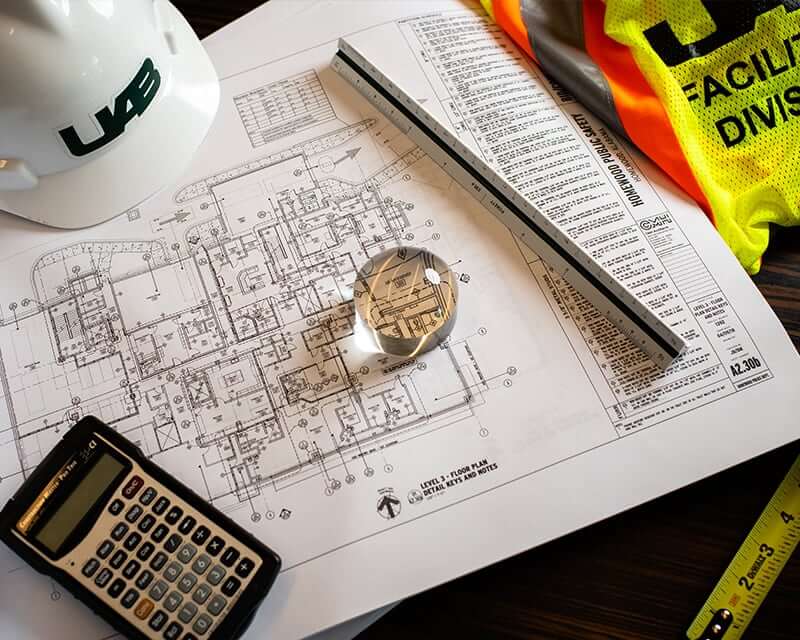To enroll in the following courses, you must be admitted through the UAB Graduate School seeking a Master of Engineering Degree in Construction Engineering Management (CEM). The core curriculum courses are subject to additional CEM fees.
-
CECM 669: Advanced Project Management
 3 credit hours.
3 credit hours.Skills generally required for sound project management in a variety of management settings are studied, in addition to specific management issues typically associated with engineering and construction companies.
Students are introduced to the Project Management Institute’s Body of Knowledge (PMBOK). A discussion of corporate organizational structures and the evolving use of project management processes helps establish an appreciation for the role of a project manager. The elements of a project and the role and responsibilities of the project manager are studied in depth. Students are also acquainted with risk management concepts, financial, labor, safety, equipment, contracting issues facing managers in the engineering and construction environment. Particular emphasis is placed on individual management strengths and weakness, team building, and characteristics of successful companies.
One of the primary vehicles for discussion will be small case studies from real companies and the outside reading of one or two relevant topical books.
-
CECM 670: Construction Estimating and Bidding
 3 credit hours.
3 credit hours.This course provides an overview of typical construction delivery systems and the planning and contracting associated with each.
A broad study of estimating methodology ranging from order of magnitude estimates to detailed unit pricing is presented focusing on labor, equipment, materials, subcontractors, job conditions, location, overhead, and profit. Students will learn about the importance of constructing a detailed Work Breakdown Structure in the estimating process.
This course is intended to establish a basic understanding of the estimating process, and therefore substantial course focus will be placed on the term group project which consists of the development of a bid estimate for a small construction project.
-
CECM 671: Construction Liability and Contracts
 3 credit hours.
3 credit hours.This course provides an overview of the fundamental aspects of the laws that affect construction and engineering companies as well as the project owners.
Particular emphasis is placed on contract forms and provisions related to liability for engineering design and construction companies, the roles of the typical participation in the process, and dispute resolution. Students will learn the importance of contract language negotiations and the impact of project risk transfer.
-
CECM 672: Construction Methods and Equipment
 3 credit hours.
3 credit hours.This course provides students a big-picture understanding of the construction methods employed to bring the concepts and designs of architects and engineers to physical reality.
The International Building Code is presented in the course material as are the fundamental principles of green building and sustainable design. Detailed study of typical building materials, design details, and construction methods are presented in a logical sequence. Students will understand the planning and deployment of equipment, materials, labor, and subcontractors using a variety of building material and system types.
This course provides a necessary baseline knowledge vocabulary and understanding of the role and activities of the designers, engineers, material suppliers, inspectors, and constructors in the commercial building process.
-
CECM 673: Techniques of Project Planning and Control
 3 credit hours.
3 credit hours.This course provides a thorough understanding of the project scheduling process in construction planning and control.
Students learn the relationship between the work breakdown structure, organization breakdown structure, and the activities used in developing project schedules. The Critical Path Method (CPM), the Precedence Diagram Method (PDM), the Program Evaluation and Review Technique (PERT), and the Line of Balance (LOB) scheduling methods are discussed in detail to include hand calculations and powerful computer software products. The use of scheduling techniques for project control, resources constraint management, cash flow management, risk management, and project completion date management are investigated as is the importance of communications in the planning and monitoring/controlling processes.
Students will experience hands on use with Primavera scheduling software.
-
CECM 674: Green Building Design/Construction
 3 credit hours.
3 credit hours.This course provides an introduction to the emerging trends in green building sustainable design and construction.
The course will include instruction suitable to prepare students for the Leadership in Energy and Environmental (LEED©) Green Building Rating SystemTM certification exam.
-
CECM 675: Advanced Construction and Engineering Economics
 3 credit hours.
3 credit hours.This course provides an extensive overview of financial and managerial accounting concepts for non-financial managers.
Students will learn the basic elements of accounting (Generally Accepted Accounting Practices). They will understand how typical financial records and financial statements are established for companies. Once the basics are understood, students will study how financial data is used for internal cost controlling, planning, and budgeting. Fundamental financial calculations associated with the time value of money, debt instruments, taxes, inflation, and cash flow estimates are emphasized.
Students will be expected to demonstrate proficiency in the use of Excel business functions in solving financial problems.
-
CECM 676: Construction Project Risk Management
 3 credit hours.
3 credit hours.This course addresses the methodologies employed in the engineering and construction industries to assist in rational decision-making in the face of uncertainty.
The course reviews the fundamentals of common probabilistic theories and models, data sampling, hypothesis testing, and the basics of Bayesian Decision Theory. In addition, basic financial analysis tools will be reviewed. Theoretical models will then be applied to specific examples encountered in engineering and construction decision making with emphasis on engineering economics applications.
-
CECM 688: Construction Management and Leadership Challenges in the Global Environment
 3 credit hours.
3 credit hours.This course is designed to prepare students to face the demanding management and leadership challenges facing construction and engineering industry leaders as competition becomes ever more globalized.
The necessity to personally remain trained and relevant in the changing business environment is emphasized. Strong resume writing and oral interview skills are emphasized as a necessary skill for job seekers as well as job providers. Strategic planning, management, and leadership in the built environment requires savvy leaders with exceptionally developed analytical and communications skills suitable for multi-disciplinary and multi-national ventures. Every individual and organization must continually innovate and reinvent to stay competitive.
Students participate in a group project designed to reinforce the methodology associated with preparing and presenting a dynamic business plan. This course will provide the opportunity for students to discuss and research these concepts and to recognize the necessity to think independently, challenge conventional thinking, and visualize alternatives.
-
CECM 689: Building Information Modeling (BIM) Techniques
 3 credit hours.
3 credit hours.This course provides students with an overview of the evolution of BIM technology in the construction industry followed by hands-on training in the basic application of contemporary BIM software.
Students will learn basic modeling skills and how to produce graphical presentations. Advanced applications of BIM technology will be discussed and demonstrated. Students will be provided with BIM software and will be required to complete a multi-step BIM model as a term project.